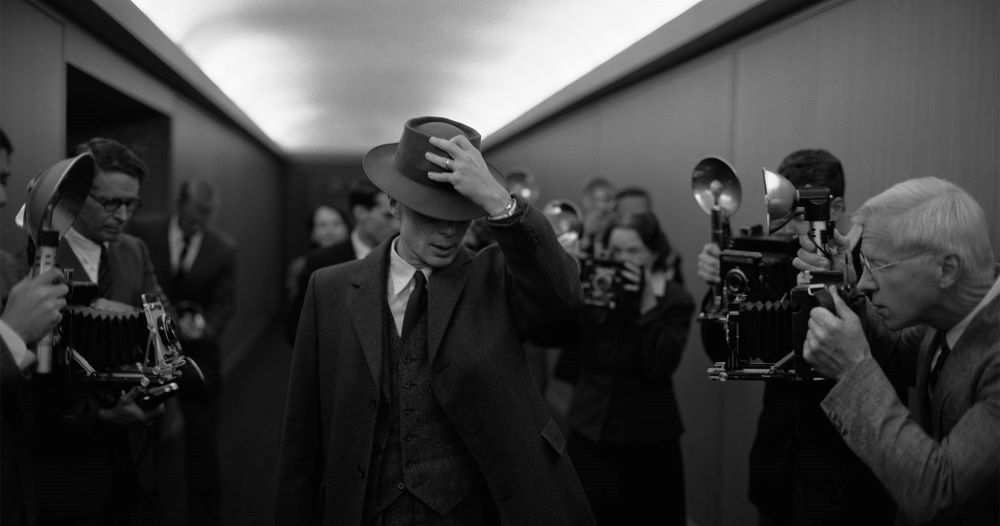
Cillian Murphy is shown in a scene from the Universal Pictures' film "Oppenheimer." Murphy plays J. Robert Oppenheimer, the theoretical physicist who directed the Los Alamos Laboratory and was known as "the father of the atomic bomb." (Courtesy of Universal Pictures)
Like millions of other people last weekend, I made my way to a movie theater to watch one of the two highly anticipated films of the summer: "Oppenheimer." The other big movie, released on the same day, was, of course, "Barbie," which I hope to also see sometime soon. The simultaneous debut of two blockbusters on the same day led to the internet meme "Barbenheimer," juxtaposing two very different genres and subjects, but also providing a possible double feature for those willing to watch both movies in one sitting and able to get tickets to both.
I have long been a fan of the work by director and screenwriter Christopher Nolan, which includes the Dark Knight trilogy (2005-2012), "Memento" (2000), "Inception" (2010), "Interstellar" (2014) and "Dunkirk" (2017), among others. In my opinion, Nolan has never made a bad movie. I absolutely love "Inception" (it remains one of my all-time favorite movies), but even those Nolan films that are not in my top list are still arguably excellent. So, when I first learned that he was working on a massive biopic about J. Robert Oppenheimer, I was already sold and looked forward to its eventual release.
But it was also the subject matter that captured my interest. I have been somewhat obsessed with the history of nuclear weapons and energy since I was a kid. Not only have I been fascinated with the atrocities of Hiroshima and Nagasaki perpetuated by the United States at the dusk of World War II, but I have also been enthralled by nuclear accidents and disasters such as the 1979 incident at Three Mile Island in Pennsylvania and the 1986 horrors of the meltdown at the Chernobyl power plant in Ukraine, which was then part of the Soviet Union. I have watched documentaries about these incidents, read books like Midnight in Chernobyl: The Untold Story of the World’s Greatest Nuclear Disaster by Adam Higginbotham, and was so captivated by the HBO limited television series "Chernobyl" that I watched the whole thing twice.
'Oppenheimer' forces viewers to remember this is real, this is now, the threat is not to be taken lightly, minimized or dismissed.
The Venn diagram of overlapping appeal between director and subject matter was a perfectly aligned circle in my case. And the film lived up to, if not exceeded, my expectations.
There is so much to appreciate about the movie. Obviously, the director, cast (especially Cillian Murphy, Emily Blunt, Florence Pugh, Matt Damon and Robert Downey Jr., among others), Nolan's adaptation of the Pulitzer-Prize-winning biography American Prometheus: The Triumph and Tragedy of J. Robert Oppenheimer, cinematography, sound engineering and nearly everything about the production of the movie are extraordinary. I expect many award nominations and wins for "Oppenheimer" ahead.
But the biggest star and most important character of the film was none of these people. From my perspective, it wasn't even the namesake of the movie (with all due respect to Dr. Oppenheimer). The most important star was the atomic bomb itself.
In an interview with The New York Times, Nolan described Oppenheimer as "the most important person who ever lived." His reasoning was that it was under Oppenheimer's direction at the Los Alamos laboratories in New Mexico that the first nuclear weapon was created and successfully tested. It was under Oppenheimer's supervision that the ability for humanity to destroy not just itself, but perhaps also the entire world, was created.
Oppenheimer is indeed a fascinating historical figure and what he helped create with the assistance of thousands of other scientists and engineers is nothing short of awesome (in the literal sense). But Oppenheimer the man is nowhere near as interesting, frightening and cosmically significant as the original weapon of mass destruction he is credited with unleashing on the world. What I believe this film does so well is tell two intersecting origin stories.

A scene from "Oppenheimer," which opened July 21. (Courtesy of Universal Pictures)
The first is about the ostensible protagonist, an American theoretical physicist who was recruited by the government to oversee a gamble of a research project to harness nuclear energy to destroy whole cities at a time of world war. The second is an origin story about the real protagonist, the nuclear bomb, which continues to live on and haunt the entirety of creation even at this very moment.
Even as I marveled at the sheer beauty of the acting, writing and cinematography, I never forgot about the horrors that were to follow and the counterfactual thought that such horrors might never have occurred if this bomb had not been made.
While impossible to fully convey the magnitude of what was unfolding in the laboratories of Berkeley and Chicago or in the conference rooms and research facilities in New Mexico — because even those involved in inventing nuclear weapons weren't sure themselves of what would happen when someone eventually pushed the trigger — Nolan does a good job reminding the viewers with the power of hindsight that something terrifying did happen and it continues to threaten us today.
It is easy to be merely entertained by this cinematic accomplishment, but the true star of the film beckons us to remember that this is more an etiological narrative, an origin story about great fear and destruction wrought by this horrific invention. There were discomfiting times throughout the film when I found myself realizing once again that this was not some scary work of fiction, but a dramatization of an even more frightening reality.
By compellingly recounting the beginnings of the nuclear era, Nolan's "Oppenheimer" forces viewers to remember this is real, this is now, the threat is not to be taken lightly, minimized or dismissed.
Advertisement
In the decades that followed, thousands upon thousands of weapons far greater than what was unleashed in Los Alamos and then upon the Japanese people in Hiroshima and Nagasaki have been developed by our country and others around the globe. At the same time, very few contemporary people think about nuclear weapons or war on a regular, let alone daily, basis. And yet, the threat to each and all of us is even greater now than it was in the 1940s. This is a fear Oppenheimer publicly warned about after World War II, but politicians and military leaders didn't listen then, and I doubt few would take seriously a conversation about nuclear disarmament today.
After the film ended, the credits rolled and I walked out of the dark theater into the light of day, my first thought was gratitude for the gift of human creativity and invention, on display both in the production of this film and in the subject matter it portrayed. As terrifying as nuclear weapons are, there is something awe-inspiring that human beings were able to harness that kind of unspeakable horror and violence.
My second thought was that I needed to return to and reread Santa Fe Archbishop John Wester's 2022 pastoral letter "Living in the Light of Christ’s Peace: A Conversation Toward Nuclear Disarmament." It is a vitally important and compelling church document that reminds us of the persistent dangers nuclear weapons still pose today and the moral responsibility we have as Christians to advocate on behalf of and work toward nuclear disarmament.
"Oppenheimer" put nuclear weapons on center stage as the star of the show. Let us not waste this moment of remembrance. May we use this occasion to reckon with what nuclear weapons have wrought and do our part, as Oppenheimer himself advocated after the war, to stop this apocalyptic chain of events leading to nuclear annihilation.








